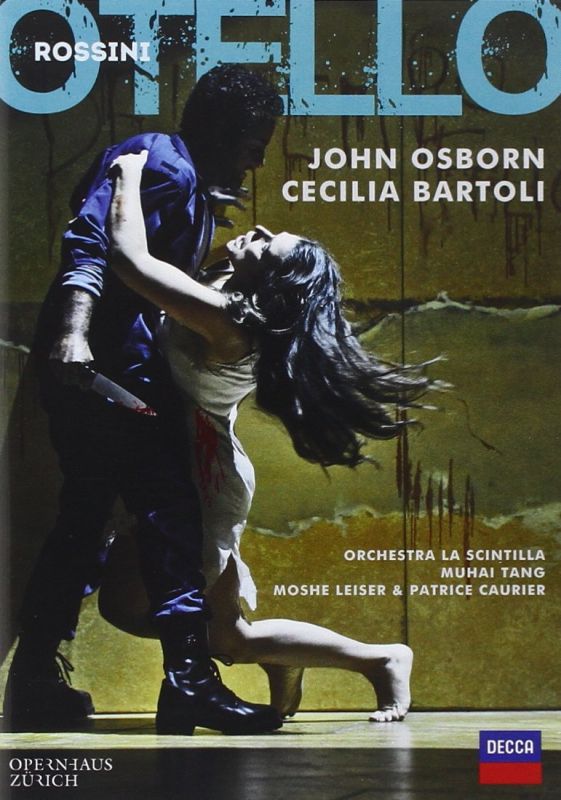ROSSINI Otello
View record and artist detailsRecord and Artist Details
Composer or Director: Gioachino Rossini
Genre:
Opera
Label: Decca
Magazine Review Date: 07/2014
Media Format: Digital Versatile Disc
Media Runtime: 156
Mastering:
DDD
Catalogue Number: 074 3863

Tracks:
| Composition | Artist Credit |
|---|---|
| Otello (or Il moro di Venezia) |
Gioachino Rossini, Composer
Cecilia Bartoli, Desdemona, Mezzo soprano Edgardo Rocha, Iago, Tenor Gioachino Rossini, Composer Javier Camarena, Rodrigo; Lucio, Tenor John Osborn, Otello, Tenor La Scintilla Orchestra, Zurich Liliana Nikiteanu, Emilia, Mezzo soprano Muhai Tang, Conductor Peter Kálmán, Elmiro, Baritone Zurich Opera House Chorus |
Author: Richard Osborne
The staging updates the action, though in the hands of directors Moshe Leiser and Patrice Caurier the update is discreet and finely managed. The Venetian setting cannot be changed – what would become of the offstage gondolier’s song which has haunted audiences down the years? – nor does it require any special directorial intervention to point up the elements of racial conflict which Maria Berio’s libretto makes no attempt to disguise. Men in suits congratulating a successful commander-in-chief whose colour is a problem for some is not without its contemporary resonance.
The use of modern ‘effects’ is sparing but telling. I think of Desdemona copying out the words of the gondolier’s meditation on the pain of the remembered time, the paint dripping red down the palazzo wall; or, a little later, Desdemona taking out a wind-up gramophone to play the haunting harp solo which prefaces the Willow Song.
The performance is a powerful one musically. The opera’s high points come in the lyric writing for Desdemona in Act 3 and the brutal confrontations between Desdemona, her father Elmiro (chillingly played by Peter Kálmán as a corporate power-broker), her would-be lover Rodrigo (Javier Camarena, superb in his big Act 2 aria and properly angst-ridden throughout) and Otello himself. Quite a lot of Otello, of Act 1 in particular, is played in accompanied recitative. One of the strengths of this production is the way Bartoli’s hand-picked cast plays these recitatives, ‘lifting’ the words to give the text eloquence and point. John Osborn’s Otello – a role that has no set-piece arias – is especially fine in this respect.
Bartoli herself has come a long way since an early recital disc (Decca, 9/89 – nla) on which her account of the Willow Song and Prayer was little more than an inventory of the notes, dutifully sounded. The voice is darker now, a touch husky perhaps in its very lowest register but gloriously full and free higher up. This is a powerful performance, strongly limned, freighted with feeling.
The Zurich house has a long tradition of using period instruments where appropriate. Here the playing of the in-house Orchestra La Scintilla under veteran Chinese conductor Muhai Tang is as compelling as it is assured, not least in the Grand Guignol of the murder scene (more Berio than Shakespeare but here shrewdly staged). Stendhal described the opera’s impact as ‘volcanic’ and so it seems. Closely miked sound, vivid and well defined, helps the cause.
Discover the world's largest classical music catalogue with Presto Music.

Gramophone Digital Club
- Digital Edition
- Digital Archive
- Reviews Database
- Full website access
From £8.75 / month
Subscribe
Gramophone Full Club
- Print Edition
- Digital Edition
- Digital Archive
- Reviews Database
- Full website access
From £11.00 / month
Subscribe
If you are a library, university or other organisation that would be interested in an institutional subscription to Gramophone please click here for further information.




